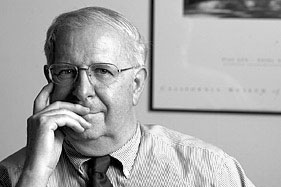Carl Benton Straub
Tribute to retiring faculty member Carl Benton Straub, professor of religion and Clark A. Griffith Professor of Environmental Studies, by his colleague John S. Strong, Charles A. Dana Professor of Religion

If you look up Carl in the back of the College Catalog, you will find him listed, high among the full professors, with a B.A. from Colgate, an S.T.B and a Ph.D. from Harvard, and “1970” in parentheses next to his name, indicating when he first began teaching at Bates. The Catalog, however, has it wrong. The year 1970 is when Carl began as assistant professor (and assistant dean of the faculty), but from 1965 to 1969 he was an instructor in religion and cultural studies here.
We thus mark, this year, the conclusion of a 40-year teaching career at Bates during which Carl not only rose through the professorial ranks but also served for 17 years as dean of the faculty. When you realize that the vast majority of full professors at Bates today, as well as a good number of associate professors, were appointed by Carl, to say that he left his mark on the faculty of this institution is an understatement indeed.
Carl was the only administrative officer I met when I came for my on-campus interview in 1978. There were no other deans of the faculty, and Hedley Reynolds was absent at the time of my visit. Perhaps because I was a candidate in religion, Carl’s own field (but perhaps not, for I somehow doubt I was an exception), I actually met with him twice — once formally, in his office, and a second time, late in the evening, over scotch, in his home (the present Center for Service Learning). He had asked me to stop by for another chat, after my dinner with department members, before driving me back to my hotel. Fresh from interviews on other campuses, I remember thinking, “Boy, they take this process seriously here at Bates.”
But Carl also made his influence felt on generations of students, all of whom remember him and most of whom, uncannily, he remembers as well. I know this because Carl’s office is just down the hall from mine, and, over the years, I have observed a parade of alumni from every generation pass me by and knock on his door, with the greeting that we all dread: “Hello, Professor Straub, remember me?” And, damn it, he does.
Carl started by teaching in the Cultural Heritage program — “Cultch” — the four-course sequence of core courses on Western civilization required of all juniors and seniors. He then also taught courses in the Department of Religion — among them “Religion in the American Experience,” “The Theology of Culture,” “Christianity and its Modern Critics,” various courses in religious ethics, and the introduction to religious studies called “Sacred Space.” In 1996, when the interdisciplinary Program in Environmental Studies was established, Carl also started teaching a number of courses in that field, including the core course “Nature in Human Culture,” as well as “Environmental Ethics,” and “Wilderness in the Religious Imagination.” In the same year, he was appointed the Clark A. Griffith Professor of Environmental Studies.
Accustomed to thinking of Carl as a person interested in religion and culture, in American religion, and in post-Enlightenment critiques of religion, I remember being a bit surprised by this and thinking of Carl’s interest in environmental issues as something new that he had recently developed. Nothing could be further from the truth. As Carl himself has put it, “I’ve been interested in the relationship between culture and the natural environment since…long before it became fashionable in undergraduate curricula.”
This was driven home for me a few years ago when I happened to find myself in the bottom floor of the stacks of Harvard Divinity School’s Andover Library, looking for some tome relevant to my research at the time. My quest took me through the section of bound dissertations. They were all there in alphabetical order, the theses of former religion Ph.D.’s, each inscribed with the name of its author. It was like passing quickly through a religious studies Hall of Fame. Names I knew flashing before my eyes, I had almost reached the end of the row, when a particular name leapt out at me: Straub. Whoah. I stopped in my tracks. Eagerly, I pulled down the hefty typewritten tome and read the title: “Providential Ecology: Puritan Envisagement of Their Wilderness Environment.” And then I realized: Carl was right. He had seen all of it then, from the beginning: America, culture, nature, the Puritans, the environment — no, even better: their environment — the wilderness. The year was 1971. “Ecology” (whether providential or not) must have been a neologism, and “envisagement of the environment” a concept before its times. Suddenly it all made sense. Carl was/is a pioneer in a field that finally has come into its own.
We will miss him, and we wish him well.